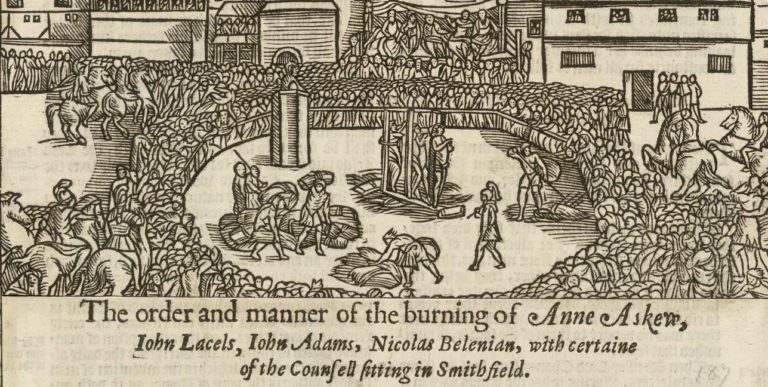I grew up in a church where we were taught to pray to Mary, but I joined a Protestant church at the age of twelve. That switch meant many years of me basically ignoring the mother of Jesus. And I was not alone. Peter Jensen sums up a not uncommon Protestant experience:
To my mind … the exaltation of Mary … obscures her and in a sense frightens us off [and] means that we don’t look at her clearly enough as she’s presented to us in Scripture, and it means that we’re denied, or we deny ourselves, an edification that we can gain from the truth.[1]
Mary’s the Model
So how can Mary edify us? By being a model disciple and a magnifier of God. Small things—that little ladybug—look bigger when you look through a microscope. Big things—that huge city or planet—reveal their magnitude when we look at them through a telescope. That’s the sort of magnification that Mary does for us in Luke 1:46-55.
God is big—Mary can’t make him bigger. But she draws our attention to God’s bigness.
God is big—Mary can’t make him bigger. But she draws our attention to God’s bigness. She praises God, declaring who he is and what he has done for her and others. She takes God at his word and praises him for what (she confidently believes) he is about to do.
Mary’s Faith
We know from earlier in Luke 1 that the angel Gabriel visited Mary and told her that she would give birth to the promised Messiah. Mary’s reaction to this fantastic news? Not disbelief (like old Zechariah showed when he was told his wife Elizabeth would give birth). Instead, Mary focuses on God and his word: “I am the Lord’s servant,” she says in verse 38, “may your word to me be fulfilled.”
Mary is a model for us as Christians because she demonstrates the regular pattern of the Christian life. When God speaks, what does she do? She trusts, obeys, has joy, and therefore shares the news of what God has done.[2] She helps us see the certainty of who God is; that his word is trustworthy; that he’s faithful to his promises; that he shows mercy. But Mary also does something that some of us may not do. She magnifies the Lord.
The Great Reversal
Mary magnifies God because of the great reversal he brings about through Jesus. At this point in salvation history in Luke 1, Mary cannot yet understand all that means. But she gets that it is God who will bring the reversal. For Mary, God’s word is so certain and trustworthy that she speaks as if it’s happened.
Sometimes (always?), our view of God is too small. Magnifying is the process of having our idea of God enlarged, and that will only happen if we understand ourselves before God. Mary gets that. She understands that she is God’s humble, lowly servant (vv. 38, 48). And it doesn’t bother her at all. She doesn’t see herself as a victim or as simply passive—though some modern critics describe her that way.
Instead, Mary rejoices. She believes that being the Lord’s servant is best; that his word is good and trustworthy. She declares that God has always kept his promises (v. 55); that he is holy, merciful, and mighty (vv. 49-51). And since God brings about the great reversal, those who trust in his word (like Mary) are making the most radical and counter-cultural decision!
Those who trust in God’s word (like Mary) are making the most radical and counter-cultural decision!
After Mary’s song, Luke’s account is striking in its brevity. Luke tells us that Mary stayed with Elizabeth for about three months, and then she went home (v. 56). It just finishes like a normal thing that any woman would do—go home after you’ve stayed with relatives. And I think that’s helpful. Mary was a woman—just like any believing woman in many ways. An extraordinary thing did happen to her; she was the mother of our Lord. But that’s not the essential thing for Mary eternally. She’s not sinless; she doesn’t dispense grace; she’s not a redeemer. She’s not fully God and fully human like Jesus.
But Mary trusts in God’s word—that’s the thing that counts. In fact Jesus makes it clear later in Luke’s Gospel by saying those who hear his word and obey it are the are even more blessed than his mother (11:27-28). In Luke 1, Mary did trust God’s word: she had a big view of God. Later in Luke’s Gospel, she, along with the other disciples, has become confused and forgotten her magnificent view of God.
When God is Small
Sometimes our view of God is too small. What happens when your view of God is too small? We can believe things such as:
- God is not good;
- I need to control every aspect of my life;
- Life is all about the here and now;
- God does not love me;
- Prayer makes no difference;
- Evangelism makes no difference;
- Living a godly life makes no difference;
- God does not see all that I do behind the scenes;
- Jesus will never return.
When our view of God is too small, we don’t trust and obey God. This results in not having Christian joy and, therefore not telling others what he has done for us.
This is where Mary’s example in Luke 1 can help us. Mary has a big view of God because she trusts God’s word when she hears it. She obeys it—which then leads her to have joy. Then she shares this with others.
In all this, Mary demonstrates the typical pattern of the Christian life. There’s something about Mary. She is a model and a magnifier that can help build us up in the truth as Christians.
[1] Peter Jensen, ‘Mary: the Second Eve?’, 21/10/15 (https://paa.moore.edu.au/resources/mary-the-second-eve-by-peter-jensen/) (accessed 19/04/22).
[2] It’s important to note that this typical pattern of the Christian life doesn’t negate suffering, as we see later in the New Testament e.g., with the life and teaching of Paul.















